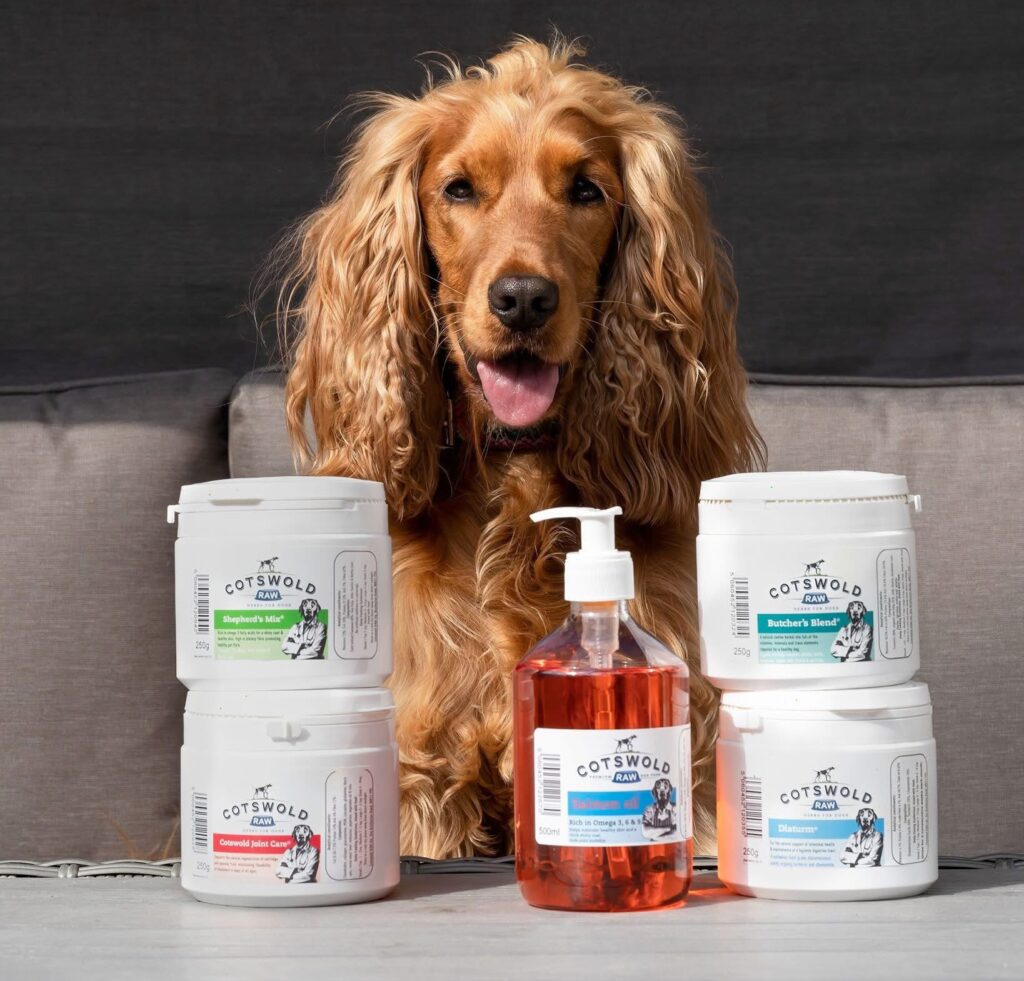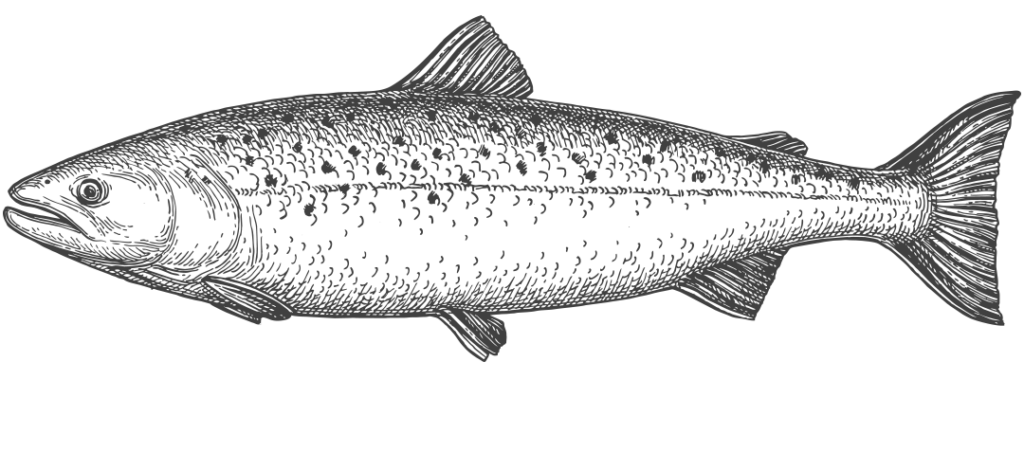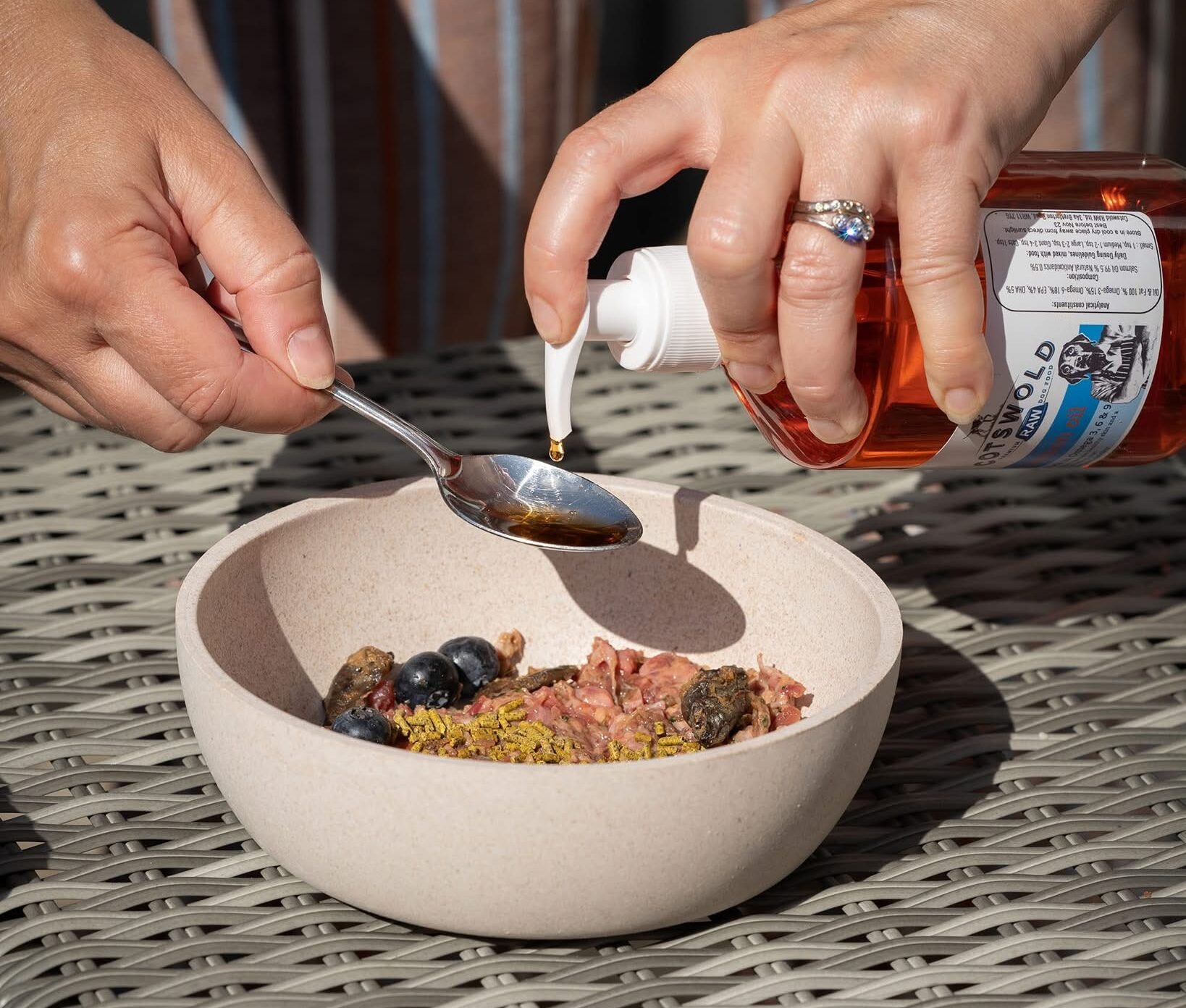Salmon oil is a brilliant addition to your dog’s diet, thanks to it’s abundance of polyunsaturated fatty acids (PUFAs). It offers a myriad of health benefits (and not to mention, dogs find it delicious!). Our pure Atlantic salmon oil is cold pressed, and filtered to remove any potential contaminants which can be present in fish, such as heavy metals.
PUFAs offer a wide range of health benefits for our dogs, primarily due to their anti-inflammatory properties and role in maintaining healthy cell membranes (1). Salmon oil certainly delivers with its offering of omega-3, omega-6 and omega-9, however in this blog we will mainly focus on the omega-3.
The most important omega-3 fatty acids provided are Eicosapentaenoic acid (EPA) and Docosahexaenoic acid (DHA). EPA is an important anti-inflammatory, whilst DHA supports cognitive health and development (2). EPA and DHA play an important role in inhibiting uptake of Arachidonic acid (omega-6 fatty acid), which shifts it’s metabolism and reduces production of inflammatory mediators (3).
Like ourselves, our dogs cannot produce their own EPA and DHA naturally, and it should be included in the diet. Including salmon oil as part of your dog’s diet increases the blood serum concentration of omega-3 fatty acids, DHA and EPA as well as decreasing the dietary omega-6:omega-3 ratio to 5:1, which is the optimum (1,6).

What Are The Benefits?
Better Skin Health
PUFAs serve important functions in skin barrier structure and condition (4). Skin cell cohesion is enhanced by these fatty acids, which provide an efficient water barrier to the skin, reducing cracking and flaking (4). Supplementing additional omega-3s can improve coat and skin health, subsequently helping to soothe itchy skin and reduce inflammation.
Processed dry foods can have an omega-6:omega-3 ratio as high as 30:1 (which is a far cry from the 5:1 optimum) due to the excess of carbohydrates, and poor quality fats. This can be detrimental to a dog’s skin health, due to the inflammatory effects exerted by high levels of omega-6. During a feeding trial in healthy dogs, salmon oil was able to decrease the total omega-6:omega-3 ratio to optimal levels, by increasing serum levels of omega-3 fatty acids (1).
Additional Joint Support
Salmon oil is a great option for supporting joint health in older and larger dogs, due to the anti-inflammatory, and joint lubricant properties of omega-3 fatty acids. As fish oil is rich in omega-3 fatty acids, it has been shown to improve symptoms in dogs with osteoarthritis, and increase joint mobility (4). Supplementation of EPA and DHA in the diet has even been shown to reduce pain scores in some dogs (3).
Improved Cognitive Function
DHA is very important for brain development. Puppies consuming diets supplemented with EPA and DHA have been shown to perform better on cognitive tests, potentially as a result of an enhanced learning ability (7). This means that including salmon oil in your pup’s diet can positively impact their training and socialisation.
Adding DHA to a senior dog’s diet has been associated with beneficial effects on cognitive performance (8). Thus, salmon oil supplementation can assist with reducing cognitive decline in elderly pets, keeping their mind sharp.
Diets too low in PUFAs can cause increased aggression and stress related behaviours (I). Compared to normal dogs, aggressive dogs showed significantly lower DHA concentrations, and a higher Omega-6:Omega-3 ratio (9). Thus, low levels of Omega-3 in the diet could be linked to aggressive and inappropriate behaviours. Serotonin function is also affected by omega-3 fatty acids (4).
High In Vitamin D
Like offal, salmon oil provides a natural source of vitamin D (5), which is essential for regulation of phosphorous and calcium, in turn supporting healthy teeth and bones.
Kidney Support
DHA and EPA supplementation is suggested in dogs with kidney disease, due to their anti-inflammatory properties. In experimental studies, supplementation of these omega-3 fatty acids reduced proteinuria, and exerted protective properties on the kidneys (10).
Heart Support
Inflammation is associated with heart failure, thus opting to naturally reduce inflammation through the diet can help support your dogs heart health into their old age. In fact, supplementation with PUFAs has been found to reduce the risk of atrial fibrillation, and ventricular arrythmias in dogs with heart disease (11).
How to Store and Serve Salmon Oil
It is important to store fish oil correctly, to prevent oxidation. It should be stored in a cool place, out of direct sunlight. A cupboard is fine, or even the fridge, this avoids thermal degradation of the delicate fatty acids.
Salmon oil is a wonderful addition to a complete and balanced diet, but as it is energy dense, be mindful of extra calories when serving.
Serving Suggestion
Small dogs: 1 tsp
Medium dogs: 1-2 tsp
Large dogs: 2-3 tsp
Giant dogs: 3-4 tsp
Before adding a new supplement into your dog’s diet, we suggest consulting with your vet if your pooch is on any medications, to ensure no nutrient-drug interactions.

References
- Hesta, M. et al. (2012) ‘Biological effects of short-term salmon oil administration, using distinct salmon oil sources in healthy dogs,’ Journal of Small Animal Practice, 53(12), 699-704. Available at: https://pubmed.ncbi.nlm.nih.gov/23173908/
- Gajanayake, I. (2024) ‘The use of fish oil supplements in small animal veterinary practice,’ Improve Veterinary Practice. Available at: https://www.veterinary-practice.com/article/fish-oil-supplements
- Carlisle, C. et al. (2024) ‘The Effects of Omega-3 Supplementation on the Omega-3 Index and Quality of Life and Pain Scores in Dogs,’ Animals, 14(21), 3108. Available at: https://pubmed.ncbi.nlm.nih.gov/39518831/
- Kaur, H. et al. (2020) ‘Role of Omega-3 Fatty Acids in Canine Health: A Review,’ International Journal of Current Microbiology and Applied Sciences, 9(3), 2283-2293. Available at: https://www.ijcmas.com/9-3-2020/Haneet%20Kaur,%20et%20al.pdf
- Rey, F. et al. (2023) ‘Oils as a source of bioactive lipids (olive oil, palm oil, fish oil,’ Bioactive Lipids. Available at: https://www.sciencedirect.com/topics/agricultural-and-biological-sciences/salmon-oil
- Brady, C. (2021) Feeding Dogs: The Science Behind The Dry Versus Raw Debate
- Heinemann, K. M. et al. (2005) ‘Long-chain (n-3) polyunsaturated fatty acids are more efficient than alpha-linolenic acid in improving electroretinogram responses of puppies exposed during gestation, lactation, and weaning,’ The Journal of Nutrition, 135(8), 1960-1966. Available at: https://doi.org/10.1093/jn/135.8.1960
- Hadley, K. B. et al. (2017) ‘The oil-rich alga Schizochytrium sp. as a dietary source of docosahexaenoic acid improves shape discrimination learning associated with visual processing in a canine model of senescence,’ Prostaglandins, leukotrienes and essential fatty acids, 118, 10-18. Available at: https://pubmed.ncbi.nlm.nih.gov/28288702/
- Re, S. et al. (2008) ‘Aggressive dogs are characterized by low omega-3 polyunsaturated fatty acid status,’ Veterinary Research Communications, 32(3), 225-230. Available at: https://pubmed.ncbi.nlm.nih.gov/17891468/
- Cline, M. G. (2016) ‘Nutritional Management of Chronic Kidney Disease in Cats and Dogs,’ Today’s Veterinary Practice.’ Available at: https://todaysveterinarypractice.com/nutrition/acvn-nutrition-notesnutritional-management-of-chronic-kidney-disease-in-cats-dogs/
- Mansilla, W. D. et al. (2019) Special Topic: The association between pulse ingredients and canine dilated cardiomyopathy: addressing the knowledge gaps before establishing causation. J. Anim. Sci. 97, 983–997. Available at: https://pubmed.ncbi.nlm.nih.gov/30615118/
Looking to enhance your pet’s diet? Take a look at Cotswold RAW’s range of raw dog food and raw cat food, including raw meaty bones, dried treats, and puppy food.

